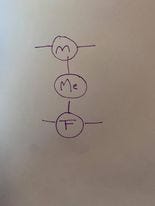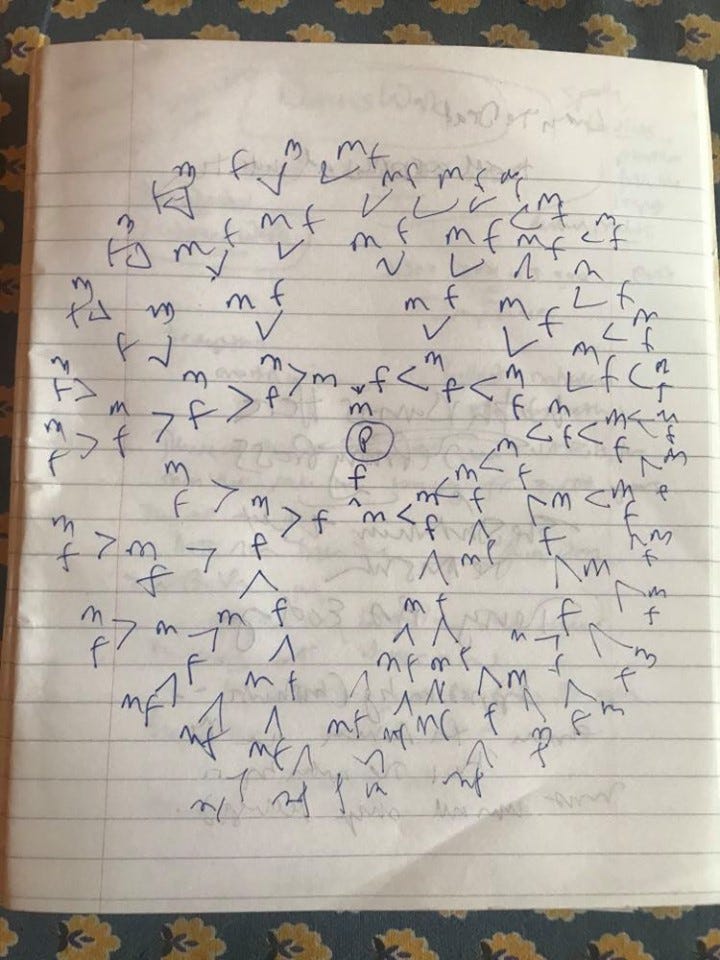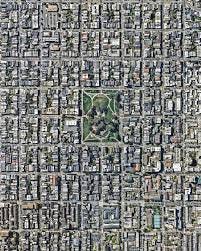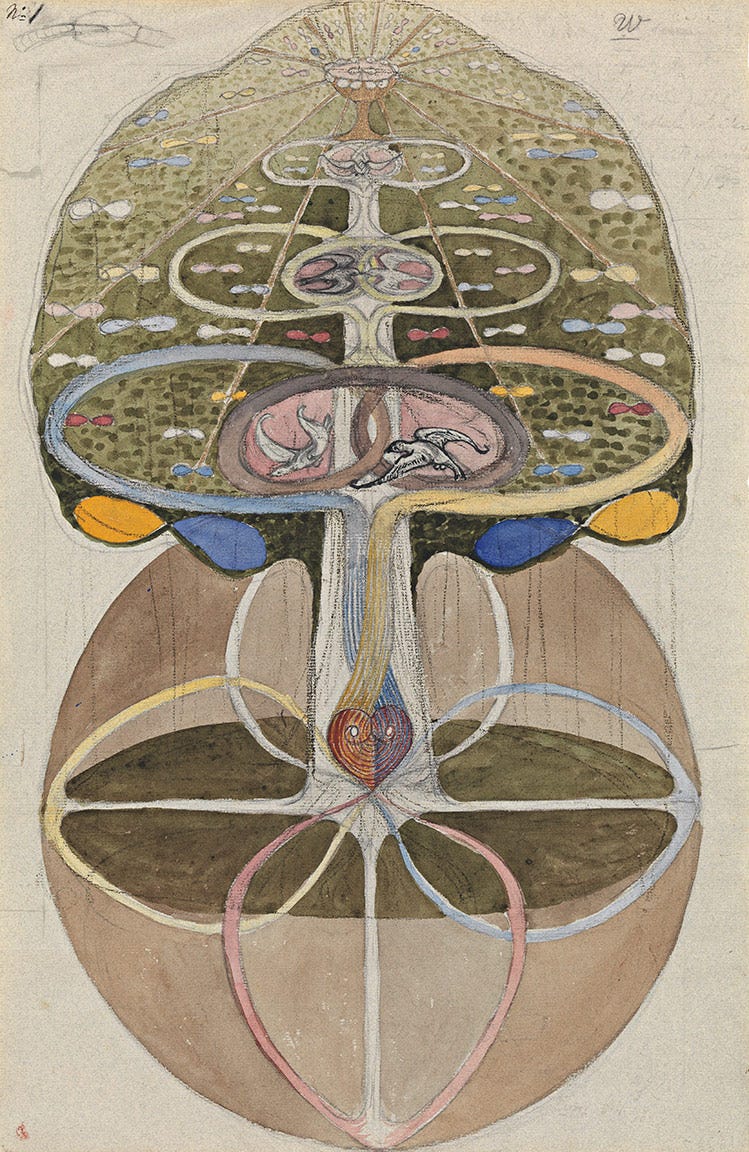[artwork: Patti Taylor]
For anyone beginning to work with those on the other side, it is common to hear folks talking about lineage healing, or matrilineal trauma, or their mother line or their father line. Such conversations often make me feel like I am dangling at the end of a belay rope of suffering and sorrow that I must, inch by inch, climb back up in order to get on with my life. Except that the very idea of a “lineage” is an idea that was introduced to make us feel burdened and defeated. The word itself is the source of so much of our civilized pain.
Often in workshops like the one I just taught, I invite people to draw a little circle at the center of a piece of paper and put their own name inside of it. From it they draw two lines and two other circles—for a mother and a father. We start here:
But if we give every mother and father, a mother and a father, we will, in just a few generations, be looking at something that is much less like a lineage, and much more like a root system.
Of course, this doesn’t include step-parents, siblings, cousins, aunts and uncles, nor any of those non-biological kin who are nevertheless often part of our families. We don’t have a clear lineage, we have a fertile mess. Which of these mothers and fathers, grandmothers and grandfathers, is most important? On what direction are we supposed to impose a line? Mother to mother, father to father, only? What if I follow my father line back seven generations and meet a woman, an ancestral grandmother, who astounds me? (I have many times) What happens when I disrupt the lineage to access the magic?
[the visionary work of Hilma af Klint[
Lineages were introduced to establish ownership. Rather than kinships of belonging we have, with the rise of patriarchal civilization, organized systems of property and primacy. The children a woman “produces” now belong to the man who sired them, just as animals belong to him, the land belongs to him, his slaves belong to him. “His” woman must be chaste and faithful so that he can ensure these children are really “his.” Lineages are all about who owns what not who loves each other.
Among hunter-gatherer peoples without fixed abodes or aquisitive tendencies we do not own the land, we belong to it. We do not own each other but belong to each other. A child born to such peoples may be nursed by many different women, recognize many men as his father-mother, and, most of all, experience the earth itself, and her plants and animals, as a mother not a possession.
Such peoples, intimate with the natural world, know that they are held in generous circles of return and reunion. The round moon waxes and wanes and becomes full again. The round earth turns around a round sun season by season. Everything that is born will die. Night follows day. Everything that dies will come back. Including every soul. We all have many mothers and fathers from many lives, most of which we do not remember. We have been men and women, plants and animals, victims and villains. Just at the root ball of the tree is woven with the roots of flowers and bushes and other trees, entangled with mycelium, swarming with snakes, too, and worms, just so beneath each of us are more ancestors than we can possibly imagine connected to us mysteriously and deeply. This is not a lineage of trauma and sorrow but the fertile dirt from which all things grow. The very ground beneath our feet is the bodies of our ancestors. Wherever we are, the land is our mother, our ancestor, where we belong.
When we defined ourselves by lineages however—this man begat that man begat this man—we imagined our lives as linear as well, with a simple beginning and a definitive ending of death or apocalypse. We followed the straight path to heaven or got dumped off the conveyor belt of life into hell. Most of all, we only have one merciless life to get it right. Our linear thinking permeates every aspect of our imaginations—from the grids we impose on the land, to our fantasies of linear evolution and progess, to our theologies encouraging us to ascend and transcend up, up, up and away, better and better each and every day. In this delusion we are not reborn to the world we have made, to beings that we have always known, to mothers that have encircled us since before the beginning of time.
To begin to think in generative circles of belonging again we need to notice when we impose linear thinking and linear words on the entwined realities of life on this earth. We do not have mother or father lines, we have mothers and fathers without end. We do not have lineages, we have root systems. The first thing we can do when we begin working with the dead is to know that they are legion, that they are beneath us, above us, around us, and within us, souls entwined world without end, life without end, love without end.
[more Hilma af Klint]
Notice the circles and cycles of the world, the spirals and meanders of the labyrinths, of the world today, and know that no one and nothing is ever lost and every soul belongs to each other. We are not each other’s property, we are each other’s mothers one life or another. We are each other’s children, one life or another. Our souls contain multitudes—and every one of those lifes calls forth roots that connect us to the heart beat of this earth.
Upcoming Workshops with Perdita:
I’m doing a 7 week journey into the magic of the ancestors, Calling on the Dead when You Need a Miracle, with the Shift Network, which begins with a FREE Zoom event. Register here: https://shiftnetwork.isrefer.com/go/acbdPF/a25018/
I’m offering a one-day Zoom intro to my work on Saturday October 18th Summoning the Ancestors.
And for those who want to do a deep dive into soul entanglements, A Year of Living with the Dead.
Perdita Finn is the author of Take Back the Magic: Conversations with the Unseen World and the forthcoming Mothers of Magic: Summoning the Wisdom of Our Ancestors (May 2026.) She is the co-founder with her husband Clark Strand of the Way of the Rose fellowship and the book of the same name. She lives with her kin in the moss-filled mountains of the Catskills.








Thank you, Perdita. This speaks to me so profoundly. I know so little about my "blood" ancestors that my "family tree" has only 4 branches. I much prefer acknowledging my the ancestors I've discovered during meditation and shamanic journeying. I feel closer to these entities than anyone else.
Maybe others have said this Perdita, but I personally have never heard anyone else say what you are suggesting. I love the entangled circles rather than the boring linear map of our heritage. My friend’s name is Carl Mayer III. I have never heard of anyone female who has these numbers after their last name; seems like a good way to enhance the male ego. So thank you for freeing us from these cultural structures which have rarely if ever been questioned.